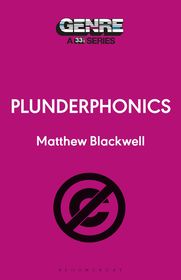
Plunderphonics
Sorozatcím: Genre: A 33 1/3 Series;
-
13% KEDVEZMÉNY?
- A kedvezmény csak az 'Értesítés a kedvenc témákról' hírlevelünk címzettjeinek rendeléseire érvényes.
- Kiadói listaár GBP 14.99
-
7 161 Ft (6 820 Ft + 5% áfa)
Az ár azért becsült, mert a rendelés pillanatában nem lehet pontosan tudni, hogy a beérkezéskor milyen lesz a forint árfolyama az adott termék eredeti devizájához képest. Ha a forint romlana, kissé többet, ha javulna, kissé kevesebbet kell majd fizetnie.
- Kedvezmény(ek) 13% (cc. 931 Ft off)
- Kedvezményes ár 6 230 Ft (5 933 Ft + 5% áfa)
Iratkozzon fel most és részesüljön kedvezőbb árainkból!
Feliratkozom
7 161 Ft

Beszerezhetőség
Még nem jelent meg, de rendelhető. A megjelenéstől számított néhány héten belül megérkezik.
Why don't you give exact delivery time?
A beszerzés időigényét az eddigi tapasztalatokra alapozva adjuk meg. Azért becsült, mert a terméket külföldről hozzuk be, így a kiadó kiszolgálásának pillanatnyi gyorsaságától is függ. A megadottnál gyorsabb és lassabb szállítás is elképzelhető, de mindent megteszünk, hogy Ön a lehető leghamarabb jusson hozzá a termékhez.
A termék adatai:
- Kiadó Bloomsbury Publishing (UK)
- Megjelenés dátuma 2025. november 13.
- Kötetek száma Paperback
- ISBN 9798765119488
- Kötéstípus Puhakötés
- Terjedelem184 oldal
- Méret 196x126x12 mm
- Súly 220 g
- Nyelv angol 700
Kategóriák
Hosszú leírás:
"
Featuring interviews with John Oswald, Negativland, and others and drawing on a wealth of research on copyright and intellectual property, Plunderphonics explores the impact of a genre that made illegality a point of pride.
In Plunderphonics, Matthew Blackwell tells the story of a group of musicians who advocated for changes to the copyright system by deploying unlicensed samples in their recordings. The composer John Oswald, who coined the genre term ""plunderphonics,"" was threatened with legal action by the Canadian Recording Industry Association on behalf of Michael Jackson. The Bay Area group Negativland was sued by Island Records on behalf of U2 for their parody of the band. These artists attracted media attention to their cause in a bid to expand fair use protections. Later, the Australian band the Avalanches encountered the limitations of the music licensing system during the release of their debut album, having to drop several samples that could not be successfully cleared. Finally, American DJ and producer Girl Talk released a series of albums featuring hundreds of uncleared samples and successfully avoided lawsuits by publicly arguing a fair use defense.
This book narrates the conflicts between these artists and the recording industry. Blackwell places plunderphonics in the cultural contexts of postmodernism, Situationism, and culture jamming and analyzes responses to the genre from the media and the legal system. Along with histories of each artist, changes to American copyright law are tracked through important cases like Grand Upright v. Warner Bros. and Bridgeport v. Dimension Films. Though the legal terrain did not shift in the favor of plunderphonic musicians, they changed public perception of fair use and enabled more widespread sampling in underground music.
Tartalomjegyzék:
Introduction
1 Pre-Plunderphonics: From Charles Ives to Grandmaster Flash
2 Postmodern Piracy: Michael Jackson v. John Oswald
3 Negativ Press: U2 v. Negativland
4 Licensing Ills: The Avalanches v. The Sample Clearance System
5 Fair Use, Fair Play: Girl Talk v. The World
Epilogue
10 Essential Tracks
Acknowledgments
Notes




